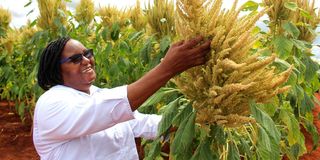New sorghum: 'A solution to alcoholism’

Rael Kisilu, a plant breeder, shows a new improved amaranth variety at a research station in Makueni County, on April 24, 2024.
What you need to know:
- Researchers say the three sorghum types cannot be attacked by birds.
- Other high-yielding and drought-tolerant crop and pasture varieties also unveiled.
The Kenya Agricultural and Livestock Research Organisation (Kalro) has developed a sorghum variety it touts as the solution to the country’s alcohol problem.
The white sorghum variety, known as “Jasiri”, is among the three Kalro unveiled recently alongside other high-yielding and drought-tolerant crop and pasture varieties.
Kalro researchers say the three sorghum types cannot be attacked by birds, one of the biggest challenges in the production of the crop.
“To tame the consumption and production of illicit liquor, the beer industry requires affordable malting material for clean and affordable brew. Sorghum is a more affordable malting ingredient compared to other materials like hops,” said George Keya, a senior scientist involved in the production of the new amaranth, cow peas, mung beans, pigeon peas, sorghum and pasture grass varieties.
“It produces clean and affordable beer. Attacks by birds have hampered the production of white sorghum that is used in the beer industry. Jasiri is a game-changer.”
Kalro Kiboko Research Station head, Simon Kuria, says the European Union funded research into the new crop and pasture varieties to improve Kenya’s resilience to droughts, mostly blamed on global warming.
Plant breeders at Kalro say producing the seeds involved elaborate selection of crops and grasses showing desirable characteristics such as drought tolerance and high yield. They were crossed repeatedly.
Dr Kuria said the new crop and grass varieties are at the commercialisation stage after passing tests by the Kenya Plant Health Inspectorate Services (Kephis).

Grace Patrick at her plot of an improved cowpea variety in Kiboko, Makueni County on April 24, 2024.
“We consulted farmers and other stakeholders, including marketers, during the selection. Sorghum growers asked for a high-yielding variety that can thrive in drylands and is not attacked by birds,” Rachael Kisilu, a Kalro plant breeder behind the new sorghum varieties, told Seeds of Gold on the sidelines of the event to unveil the new crop and grass varieties at Kalro Kiboko station in Makueni County.
“East African Breweries Ltd asked for a variety with big grains. Jasiri has weak heads, making it difficult for birds to perch. The grain has high levels of tannin, a chemical which reduces their palatability by small birds. This chemical reduces significantly when the grain is dry.”
Agriculture PS Paul Rono said the new variety seeds would help realise the bottom-up economic transformation agenda.
“Climate-smart technology developed by Kalro is a milestone in our journey towards a sustainable future. Kalro has introduced drylands crops and pasture varieties which can improve the productivity and resilience of our agriculture even in the face of severe soil moisture deficit and little rainfall,” Dr Rono said in a speech read by Badu Katelo, a senior deputy secretary at the State Department of Agriculture.
The production of the new seed varieties comes when the appetite for amaranth, mung beans (ndengu), cowpeas and sorghum is increasing in the wake of heightened campaigns on their high nutritional and economic value.
“Kenya is unable to meet 56 per cent of its demand for animal feed. Using high-yielding drought-resistant grass in rangelands is a step towards addressing the huge gap in animal feed. The upshot is a reduction in livestock deaths during dry spells and cutting the import of meat significantly,” Dr Kuria said.
Machakos Deputy Governor Francis Mwangangi and her Makueni colleague Lucy Mulili praised Kalro for the accomplishment and pledged to promote the new seed varieties.





